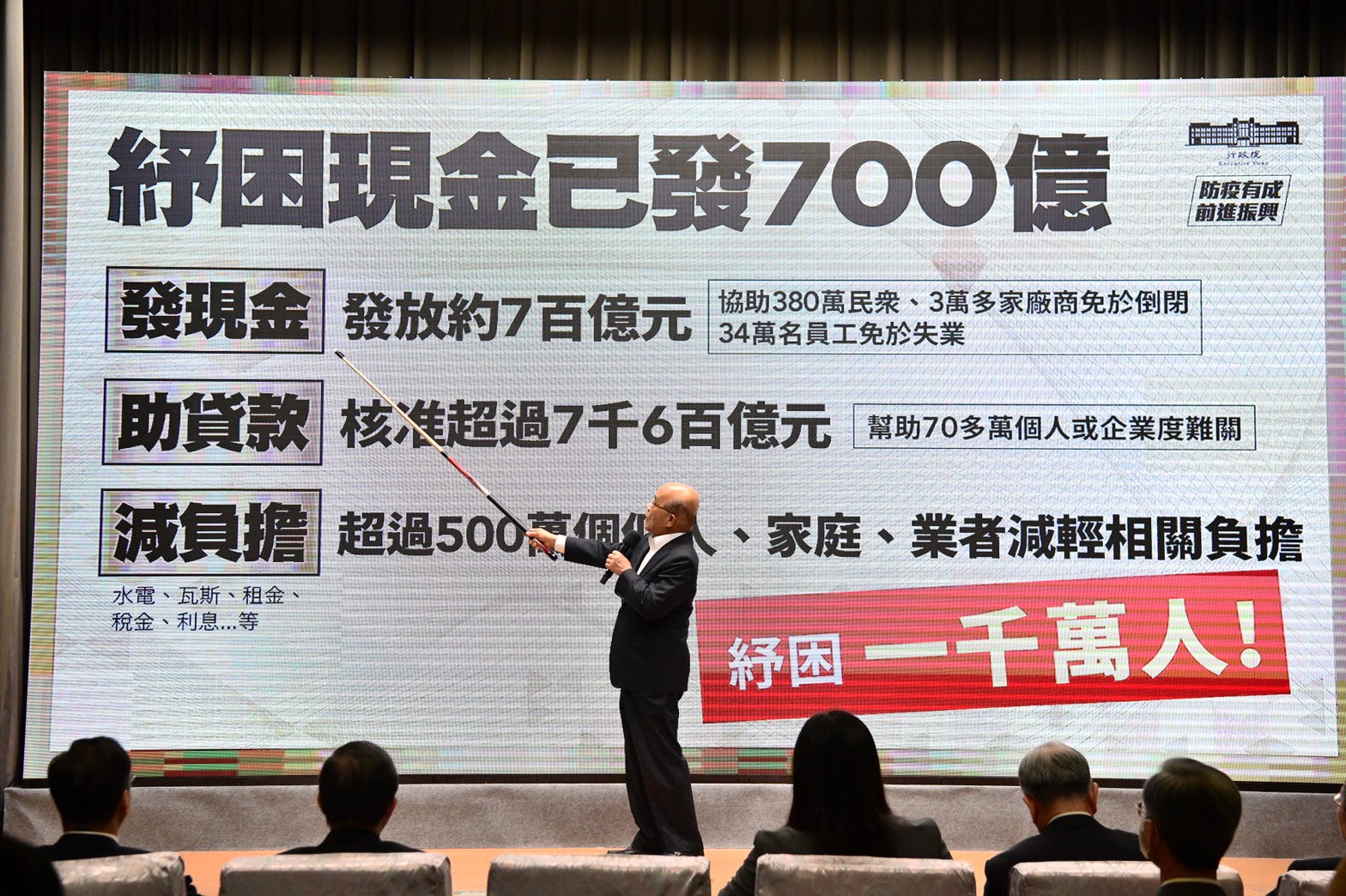
Triple Stimulus Voucher: A NT$3,000-worth of vouchers for NT$1,000.
- 地點:臺灣
- 發布日期:
- 單位:Executive Yuan
- 更新日期:2020/07/28
- 點閱次數:459

June 2 (CNA) The government said Tuesday that a new stimulus voucher program will encourage spending at brick-and-mortar retailers and boost the leisure industry, but will restrict most forms of online shopping, which has suffered less economic impact from the COVID-19 pandemic.
At a press conference Tuesday, Premier Su Tseng-chang announced the "Triple Stimulus Voucher" program, which will allow Taiwanese nationals and their foreign or Chinese spouses to buy NT$3,000-worth of vouchers for NT$1,000.
The paper and digital-format vouchers will be available for pre-sale from July 1 and will be valid from July 15 through the end of the year, Su said.
According to Su, the vouchers can be used for a range of in-store, leisure-oriented purchases, including hair and nail salons, restaurants, department stores, night markets, grocery stores and travel.
They can also be used to purchase lottery tickets, as lottery revenue helps fund social welfare programs, said Cabinet spokesman Ting Yi-ming.
Restrictions on the vouchers, Su went on, fall into 11 categories: online purchases, tax payments, traffic violation tickets, "various types of fees," tobacco, insurance payments, stocks, national pension insurance, credit card bills, gift cards and card top-ups.
The reason for not allowing the vouchers to be used for online purchases, Su explained, is that brick-and-mortar retailers have been most impacted by the COVID-19 pandemic, often to the benefit of online sellers.
However, the vouchers can be used to make online ticket purchases for events such as concerts and performances, Su said.
The vouchers will be denominated as four NT$500 bills and five NT$200 bills, which cannot be exchanged for cash or used to make payments lower than the denominated value, which means that no change will be given.
According to the Ministry of Economic Affairs (MOEA), the reason for this is both to avoid burdening retailers and to encourage additional spending.
Currently, the government expects use of the vouchers to be split half-and-half between paper and digital, the MOEA said.
The government will also transfer NT$1,000 to the bank accounts of 1.2 million low-income earners so that they can also purchase the vouchers, Su said.
In economic terms, Chu Tzer-ming, who heads the Directorate-General of Budget, Accounting and Statistics, said the price tag for the program will likely run to NT$50 billion, which will be paid for through special budgets passed by the government earlier this year.
At the same time, it could bring benefits worth double that to Taiwan's economy, Chu said.
Factoring in promotions and discounts offered by retailers to boost spending, the effect of the NT$3,000-worth of vouchers could increase to NT$4,600. Multiplying that by the 23 million Taiwan nationals and 150,000 foreign and Chinese spouses, the economic effect could top NT$100 billion, Chu said.
For those who want to take advantage of paper vouchers, they can pre-order through 11,000 FamilyMart, 7-ELEVEN, OKmart and Hi-Life convenience stores starting July 1 and receive the vouchers from July 15, explained Minister without Portfolio Audrey Tang, who is responsible for digital technology.
People can also purchase the vouchers at 1,300 post offices across Taiwan from July 15, Tang said, adding that national health insurance (NHI) cards are required as is in the case of the mask rationing program.
The vouchers will come in four NT$500 bills and five NT$200 bills, which cannot be exchanged for cash or used to generate change.
Digital vouchers can be obtained through credit cards, smart cards such as EasyCard, icash, iPASS and HappyCash, as well as mobile wallets, Tang said.
Users will have to register their accounts from July 1 and have to make purchases of NT$3,000 from July 15 in order to receive NT$2,000-worth of credit, according to Tang.
Credit card users will receive a NT$2,000 deduction from their bill the following month, and smart card users can go to convenience stores to have the credit restored to their cards, while mobile wallets will have the vouchers saved to their APP account, Tang said.
To make it more convenient for digital users, the government is developing ways for people to withdraw NT$2,000 in cash from ATMs, she said.
Asked why the government does not hand out NT$2,000 in cash directly, Su said the aim of the campaign is to generate consumption.
The 1.2 million mid-to-low-income households who cannot afford NT$1,000 will receive a direct deposit of NT$1,000 in their bank accounts they can use to buy the vouchers, Su said.
"The principles of the program are to be easy, convenient, exciting, and take care of the disadvantaged," he said.
According to Su, the vouchers will expire at the end of the year. They can be used for in-store and certain online purchases in a bid to revive consumer buying amid the COVID-19 coronavirus pandemic, he said.
For instance, the vouchers can be used at restaurants, night markets and ticket purchases via online platforms, Su said, but The vouchers cannot be used for other online shopping, nor to pay taxes, credit card bills, or stored in other forms.
Store owners who receive the vouchers can start to cash them from July 23, at banks, for instance, or re-use them for other purchases, he added.
The voucher rollout will cost NT$50 billion and is listed under the Special Act for Prevention, Relief and Revitalization Measures for Severe Pneumonia with Novel Pathogens, the premier said.
